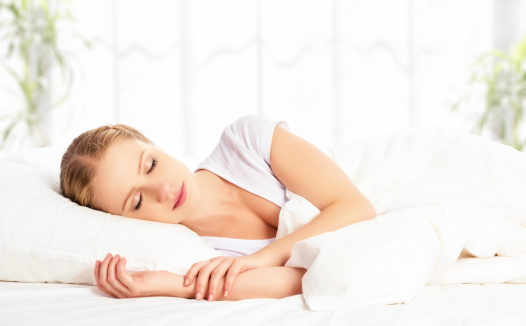For some, sleep is their favorite time of the day. It is an opportunity to lie down on a comfortable bed and put all their problems aside until the next morning.
For others, sleep has become the hardest part of the day. According to the National Institute of Neurological Disorders and Stroke (NINDS), around 40 million Americans suffer from some form of a long-term sleep disorder and another 20 million experience sleeping problems (1). These disorders include: insomnia, sleep apnea, restless leg syndrome, narcolepsy and others.
While supplementation cannot cure, treat or prevent these issues, they may support normal sleep patterns in many people. But, to understand the connection, it is important to review the basics of sleep.
It is reasonable for the average person to believe that his/her body just gets exhausted and has to rest. It would make sense considering as the day goes on, the body becomes drowsy and slows down in a way that is beyond our control. It has been said that “we are programmed to sleep each night as a means of restoring our bodies and minds” (2).
But, more is going on beneath the surface.
As the day progresses, before a person lays down in bed, “Nerve-signaling chemicals called neurotransmitters control whether we are asleep or awake by acting on different groups of nerve cells, or neurons, in the brains” (3). Such chemicals—like serotonin and norepinephrine—keep the brain alert while we are awake.
Additionally, a compound known as adenosine continues to build up in the brain the longer we stay awake, giving us the feeling of tiredness as the day goes on. Adenosine and the body’s “internal clock” help determine if and when the body is awake or feels tired (4).
Once the body falls asleep, neurons “turn off” the signals that keep us awake (3), and the body begins to break down the adenosine (4).
Sleep allows the nervous system to function properly the next day. The National Institute of Neurological Disorders and Stroke states, “Too little sleep leaves us drowsy and unable to concentrate the next day. It also leads to impaired memory and physical performance and reduced ability to carry out math calculations” (1). They also say that continued sleep deprivation could lead to hallucinations and mood swings.
Supplementation for Sleep Aid
Melatonin. This hormone is secreted by the brain’s pineal gland and helps regulate other hormones and the body’s “internal clock” (5). As the body is exposed to darkness, it begins to produce more melatonin; in response to light exposure, the body breaks down the hormone (5).
Melatonin is available for intake as a dietary supplement, and several studies suggest a benefit of normal sleep. For instance, the University of Maryland Medical Center says that people with disrupted circadian rhythms (which happens when you cross several time zones or work night shifts) and those with low melatonin levels (which is common among the elderly and those with schizophrenia) slept better at night with melatonin supplementation (5).
In one study that consisted of 10 trials, randomized airline passengers or airline staff were given melatonin or a placebo near their target bedtime (10 p.m. to midnight) before a flight that crossed over five or more time zones. In nine out of 10 trials, the supplement decreased the amount of jet lag the person experienced (6). In another double-blind, placebo-controlled study, 40 children aged six through 12 with chronic sleep onset insomnia received 5 mg of melatonin for four weeks; supplementation increased sleep time by an average of 41 minutes (7).
Magnesium. This mineral is found in many foods like whole grains, nuts and green leafy vegetables. Nonetheless, most Americans do not get the levels of magnesium that they should (8). This is important because some people who do not get enough magnesium may experience restless leg syndrome (RLS), sleep disorders or other symptoms. Magnesium supplementation is said to “enhance the effectiveness of conventional treatments” for the same conditions (8).
When studying 46 elderly subjects in a double-blind randomized clinical trial, it was found that magnesium supplementation (50 mg/day) significantly increased sleep time, sleep efficiency and melatonin levels (9).
Tart cherry juice. Just like magnesium, this is another supplement that may support good health in many different ways: sleep is one of them.
When a proprietary tart cherry juice (Tru Cherry juice from CherryPharm, Inc., Geneva, NY) was looked at in a pilot study, it had “modest beneficial effects on sleep in older adults with insomnia” (10). The double-blind crossover study had participants consume the tart cherry juice for two weeks and a placebo for two weeks. Compared to the placebo, the branded product provided “significant reductions in insomnia severity (minutes awake after sleep onset)” (10).
Theanine. This amino acid, which is found is green tea and other herbs, has a chemical structure that aids the body in transmitting impulses to the brain (11). This is why supplementation has been said to aid in anxiety and sleep disorders, among others.
One branded form (Suntheanine from Taiyo Kagaku, Yokkaichi, Japan) was studied when boys (aged 8 to 12) with ADHD took the supplement (400 mg/day) or a placebo twice daily for six weeks. It was found that those that took the supplement recorded higher sleep percentage and sleep efficiency scores than those in the placebo group (12).
5-HTP (5-Hydroxytroptophan). The “chemical by-product of the protein building block L-tryptophan” works by sending signals to the brain to increase the production of serotonin, a chemical that affects several common behaviors, including sleep (13). It can also be taken in supplement form.
A study of 18 patients with sleep disorders who were given GABA (Gamma-Aminobutyric Acid) and 5-HTP found that this combination reduced the amount of time it took patients to fall asleep, decreased sleep latency, increased the duration of sleep and improved the overall quality of sleep (14).
Herbal Remedies for Sleep Aid
Chamomile. One popular herb comes from two different plants: German chamomile (Matricaria recutita) and Roman or English chamomile (Chamaemelum nobile). The “daisy-like flowers of German chamomile have white collars circling raised, cone-shaped, yellow centers” (15). These white and yellow flower heads can be dried to create teas and capsules or they can be crushed and steamed to produce an oil that is used in medicines (15).
The dried flowers used for chamomile tea and oils “contain many terpenoids and flavonoids contributing to its medicinal properties,” explaining why the plant has often been used “as a mild tranquilizer and sleep-inducer” (16). This effect was seen in one study when 10 cardiac patients immediately fell asleep for roughly 90 minutes after drinking chamomile tea (17).
Valerian. This plant has been used by people since the second century to ease insomnia, anxiety, nervous restless and stomach cramps. And, while research has not proven how valerian actually works, scientists “believe it increases the amount of a chemical called GABA in the brain. GABA helps regulate nerve cells and has a calming effect on anxiety” (18).
A randomized, double-blind, placebo-controlled, cross-over study of 16 insomnia patients found that valerian supplementation did not have any effect after a single dose, but multiple doses showed positive effects on the patients’ sleep structure and sleep perceptions (19). And, valerian reduced slow-wave sleep latency more than a placebo.
Another study of 100 women going through menopause found a significant difference in the reduction of sleep disorders for those that took a valerian supplement compared to those that took a placebo (20).
Kava. This root from the South Pacific is often used as a tea or as a powdered supplement. It supports calmness and normal sleep (21). Some studies suggested it promotes deep sleep (21).
When supplementing 75 participants with general anxiety disorder (GAD) for six weeks with 120 mg or 240 mg of kava per day, it was found that kava “may be a moderately effective short-term option for the treatment of GAD” (22). Additionally, a 2011 meta-analysis of studies found, “The current weight of evidence supports the use of kava in treatment of anxiety with a significant result occurring in four out of six studies reviewed” (23).
Passionflower. This plant is said to have chemicals in it that have calming, sleep supporting benefits (24). The daily consumption of passionflower over a seven-day double-blind, placebo-controlled, study was found to improve sleep quality better than a placebo and “yield short-term subjective sleep benefits for healthy adults with mild fluctuations in sleep quality” (25).
Lavender. Lavender produces a calming, soothing effect when inhaled. It has been suggested that a “massage with essential oils, particularly lavender, may result in improved sleep quality, more stable mood, better concentration and reduced anxiety” (26).
A study of 42 female college students with complaints of insomnia who were exposed to the fragrance for four weeks reported that the length of time taken to fall asleep, severity of insomnia and satisfaction with sleep all improved, concluding that “the lavender fragrance had a beneficial effect on insomnia” (27). WF
References
1. National Institute of Neurological Disorders and Stroke, www.ninds.nih.gov/disorders/brain_basics/understanding_sleep.htm, accessed August 5, 2015.
2. Healthy Sleep, www.healthysleep.med.harvard.edu/healthy/science/what/sleep-patterns-rem-nrem, accessed August 5, 2015.
3. University of Pittsburgh Medical Center, “What Happens During Sleep?” www.upmc.com/services/pulmonology/sleep-medicine/resources/pages/during-sleep.aspx, accessed August 5, 2015.
4. National Heart, Lung, and Blood Institute, “What Makes You Sleep?” www.nhlbi.nih.gov/health/health-topics/topics/sdd/whatmakes, accessed August 5, 2015.
5. University of Maryland Medical Center, “Melatonin.” www.umm.edu/health/medical/altmed/supplement/melatonin, accessed August 7, 2015.
6. A. Herxheimer and K.J. Petrie, “Melatonin for the Prevention and Treatment of Jet Lag,” Cochrane Database Syst. Rev. (2), CD001520, (2002).
7. M.G. Smits et al., “Melatonin for chronic sleep onset insomnia in children: a randomized placebo-controlled trial.” J. Child Neurol., 16(2), 86-92 (2001).
8. University of Maryland Medical Center, “Magnesium.” www.umm.edu/health/medical/altmed/supplement/magnesium, accessed August 10, 2015.
9. B. Abbasi et al., “The effect of magnesium supplementation on primary insomnia in elderly: A double-blind placebo-controlled clinical trial.” J. Res. Med. Sci 17(12), 1161-1169 (2012).
10. W. R. Pigeon et al., “Effects of a Tart Cherry Juice Beverage on the Sleep of Older Adults with Insomnia: A Pilot Study.” J. Med. Food 13(3), 579-583 (2010).
11. WebMD, “Theanine.” www.webmd.com/vitamins-supplements/ingredientmono-1053-theanine.aspx?activeingredientid=1053&activeingredientname=theanine, accessed August 11, 2015.
12. M.R. Lyon et al., “The effects of L-theanine (Suntheanine®) on objective sleep quality in body with attention deficit hyperactivity disorder (ADHD): a randomized, double-blind, placebo-controlled clinical trial.” Altern Med Rev. 16(4), 348-354 (2011).
13. WebMD, “5-HTP.” www.webmd.com/vitamins/ai/ingredientmono-794/5-htp/source-3, accessed August 13, 2015.
14. W. Shell et al., “A randomized, placebo-controlled trial of an amino acid preparation on timing and quality of sleep.” Am J Ther 17(2), 133-139 (2010).
15. University of Maryland Medical Center, “German chamomile.” www.umm.edu/health/medical/altmed/herb/german-chamomile, accessed August 11, 2015.
16. J. K. Srivastava et al., “Chamomile: A herbal medicine of the past with bright future.” Mol Med Reporter 3(6), 895-901 (2010).
17. L. Gould et al., “Cardiac effects of chamomile tea.” J. Clin Pharmacol 13(11), 475-495 (1973).
18. University of Maryland Medical Center, “Valerian.” www.umm.edu/health/medical-reference-guide/complementary-and-alternative-medicine-guide/herb/valerian, accessed August 12, 2015.
19. F. Donath et al., “Critical evaluation of the effect of valerian extract on sleep structure and sleep quality.” Pharmacopsychiatry 33(2), 47-53 (2000).
20. S. Taavoni et al., “Valerian/lemon balm use for sleep disorders during menopause.” Complement Ther Clin Pract 19(4), 193-196 (2013).
21. WebMD, “Kava.” www.webmd.com/balance/stress-management/tc/kava-topic-overview, accessed August 13, 2015.
22. J. Sarris et al., “Kava in the treatment of generalized anxiety disorder: a double-blind, randomized, placebo-controlled study.” J Clin Psychopharmacol 33(5), 643-648 (2013).
23. J. Sarris et al., “Kava: a comprehensive review of efficacy, safety, and psychopharmacology.” Aust N Z J Psychiatry 45(1), 27-35 (2011).
24. Medline Plus, “Passionflower.” www.nlm.nih.gov/medlineplus/druginfo/natural/871.html, accessed August 12, 2015.
25. A. Ngan et al., “A double-blind, placebo-controlled investigation of the effects of Passiflora incarnate (passionflower) herbal tea on subjective sleep quality.” Phytother Res 25(8), 1153-1159 (2011).
26. University of Maryland Medical Center, “Lavender.” www.umm.edu/health/medical/altmed/herb/lavender, accessed August 13, 2015.
27. I. S. Lee et al., “Effects of lavender aromatherapy on insomnia and depression in women college students.” Teahan Kanho Hakhoe Chi 36(1), 136-143 (2006).
Published in WholeFoods Magazine, October 2014 (online 9/3/15)










